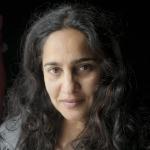CASI Deep Dive: Urmilla Deshpande and Thiago Pinto Barbosa on the Complex Legacy of Pioneering Indian Scholar Irawati Karve
Irawati Karve, regarded by many as India’s first female anthropologist and certainly the first woman to occupy a university position in the discipline, ought to be a household name. While some may know her for Yuganta, a series of Marathi essays examining the morality of figures in the Mahabharata that won the Sahitya Akademi Award in 1968 and received great acclaim in its English translation as well, Karve’s life (1905-1970) and work encompass much more.
As Urmilla Deshpande and Thiago Pinto Barbosa lay out in Iru: The Remarkable Life of Irawati Karve (Speaking Tiger, 2024), Karve was a pioneering scholar working across anthropology and sociology, path-breaking researcher unafraid to spend weeks and months out in the field, prolific essayist, feminist, and public intellectual. Beyond these prodigious achievements, the book uses the arc of her life as an opportunity to engage with a whole host of questions about 20th century Indian society, the academic world, caste, gender, and much more.
Iru begins with Karve’s remarkable journey to Berlin in the 1920s, where she would end up disproving a racist theory about skull sizes in defiance of her supervisor, Eugen Fischer, whose work would later influence the Nazi party’s ideas of racial superiority and its approach toward science. It ends with a series of ruminations from Karve, grappling with the nature of societal violence and how each one of us is implicated in it. In between, Iru paints a picture of Karve’s life, scholarship, and writing without shying away from the less celebrated aspects of her work—such as applying German-inspired tools of physical anthropology on Indian subjects—that have mostly been discarded by the discipline today.
Deshpande, an author who is also Karve’s granddaughter, and Barbosa, a postdoctoral researcher in the Institute of Anthropology at Leipzig University, collaborated to create a nuanced portrait of Karve as an important figure of 20th century Indian thought. CASI Managing Editor Rohan Venkat spoke to Deshpande and Barbosa about their unlikely collaboration, what it was like to engage with Karve’s complex legacy, the impact of Eurocentrism in social sciences, and how they settled on “critical fabulation” fact-derived storytelling as the form for this biography.
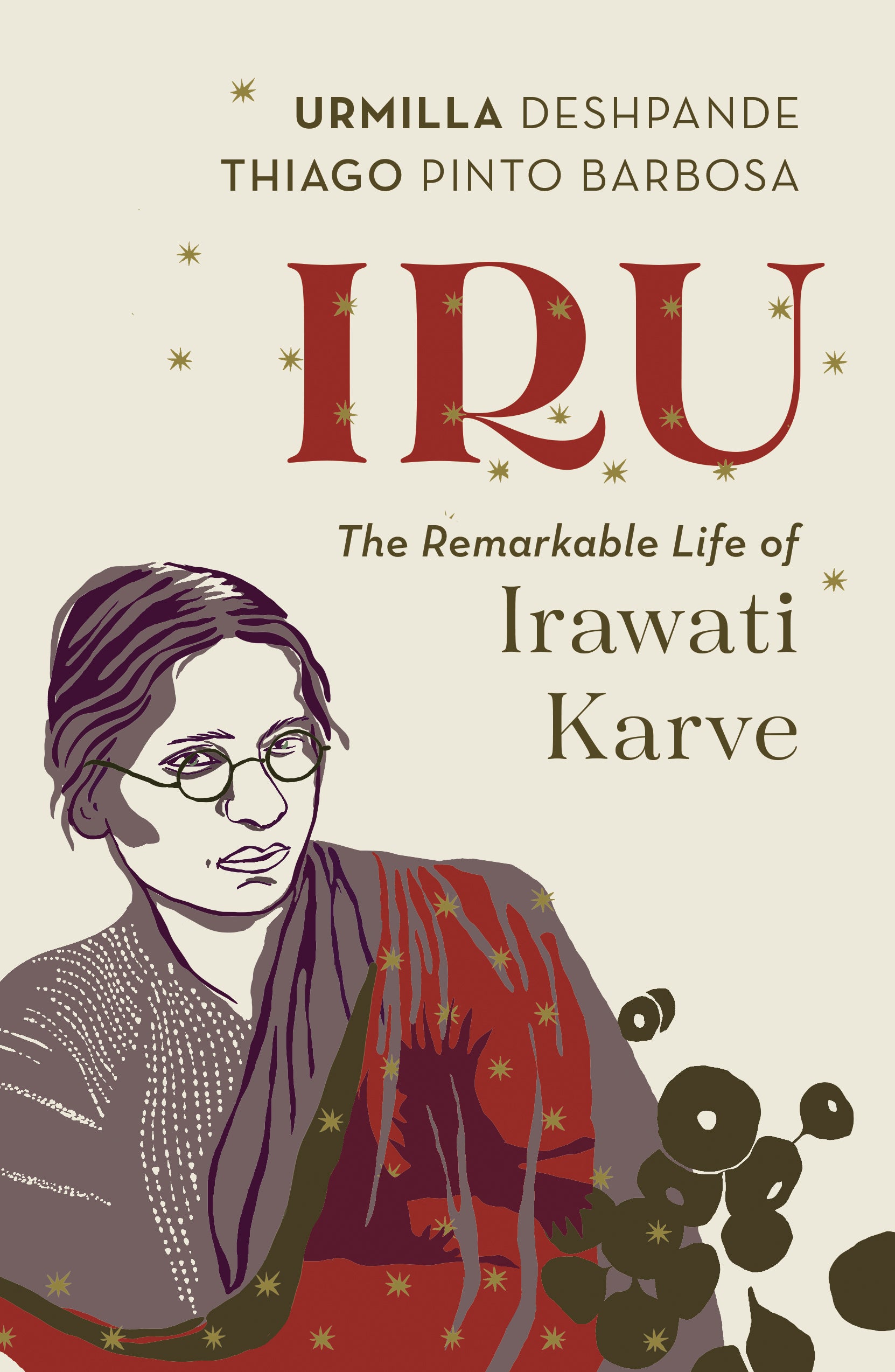 Rohan: Is there an elevator pitch for the book?
Rohan: Is there an elevator pitch for the book?
Urmilla: The book is about Irawati Karve, who is my grandmother and the subject of a case study for Thiago's dissertation. We came to it from these two different sides and we were just incredibly lucky to meet each other and be able to collaborate on this. It's about her life, her work, an exploration of the sort of person she might've been, because she died when I was seven, and Thiago never met her. It's an exploration, trying to put together who she might've been from everything that we could find.
Thiago: The book tries to portray a very intimate image of her and her work. And by doing so, the book also tries to talk about some questions related to anthropology and science and social history, crossing all the decades of her life, right from the moment she was born in the beginning of the 20th century until 1970, when she died. The mid-twentieth century was an important time in history for many discussions in science, including racism and the question of women in science.
Rohan: Many might know Karve from Yuganta, a prize-winning series of essays. Why should we know her beyond this work?
Thiago: We never thought that we wanted to write about her because she, as a figure, deserves more attention. But we did think that there were many interesting things about her life and work that are worth discussing, even today. And this might cover some of the questions we talked about earlier: the question of racism in science, the question of what it means to do anthropology, the question of what it means to be an Indian subject doing anthropology, to be a Hindu doing anthropology, and what it means to be a woman in science. I think these are all questions that are worth discussing.
Irawati, to some extent, was the first to do some of these things. She was the first female anthropologist/sociologist to occupy a university position in India. And she caught my attention because she was the first and the only person in this research center in Berlin—which used to be called the Kaiser Wilhelm Institute of Anthropology, Human Heredity, and Eugenics—to articulate a critique of racist theory in the 1920s. And I thought, it is no coincidence that it had to be a woman and a racialized person to do that kind of work.
Biographically, there are many parts of her work that are still relevant for discussions today, including the way that she thought about citizenship and nationality in India, religion, culture, and the place of women in Indian society. Apart from Yuganta, much of what she wrote can still be relevant for some of the discussions we're still having today.
Urmilla: I came to this work because I wanted to write fiction. I wanted to write a novel. Not about her, not about her life, not a biography. A novel based on a woman who was in Berlin at that time. But the publisher wanted a biography of Irawati. I didn't really know who she was until we got into this. For me, it involved talking to the people who knew her, including her daughter, thinking back on all the things that I'd been told or knew about her. All these questions began to come up about who she was and then, slowly, why she is relevant today. Those who know her anthropology work are in one very small niche area, and those who know her Marathi essays are in another small niche area. Otherwise, she's relatively unknown.
Thiago: Also, the history of science has a tradition of making women invisible. And I think part of the motivation for writing this biography is to rewrite women in marginalized positions in some way back into the history of science.
Rohan: Tell me about the form you chose: “critical fabulation.”
Thiago: Critical fabulation is an idea coined by Saidiya Hartman and also used by Projit Muhkarji. It comes from the discussion of what historians do about the fact that we cannot find any documents about the millions of women who were in the slave trade and who happened to have died in crossing the ocean, or were captured in Africa and then put to work in America. Do we not write history about them because the knowledge is not there? How do we fill those gaps in history that are important, because those stories need to be told? We need to develop ways of being able to craft narratives with the little material that we have, but still be able to tell a story somehow. This is the principle, this idea of crafting stories that are still based on very solid research.
And that's what we did. We did thorough research, we researched in archives, we interviewed many people, people who knew her, ex-students, ex-colleagues, we read all her texts, many different texts about her too, and we gathered different stories. Urmilla and I would meet in Berlin and go for walks, going to the places where she lived, where she studied. I have a long engagement with the history of the institution where she did her PhD in Berlin because I was working there. Based on all those facts, we allowed ourselves to be creative in forming a narrative that was still based on the real facts, but to try to make a biography that would still be more accessible to the reader and somehow try to get as close to her as we could in this portrayal of this person.
I didn't want to write a boring biography. I think this was also our concern because there's so much poetry in the things that she writes as well. And I think working with Urmilla was a real blessing because I'm an academic writer. I'm not so trained in writing things beautifully, even though anthropology has many discussions about how to write and engage with the poetics of reality. That's something that Karve herself also did in her writings. And that's something Urmilla did really well. So, I think our collaboration managed to get the best of each of us.
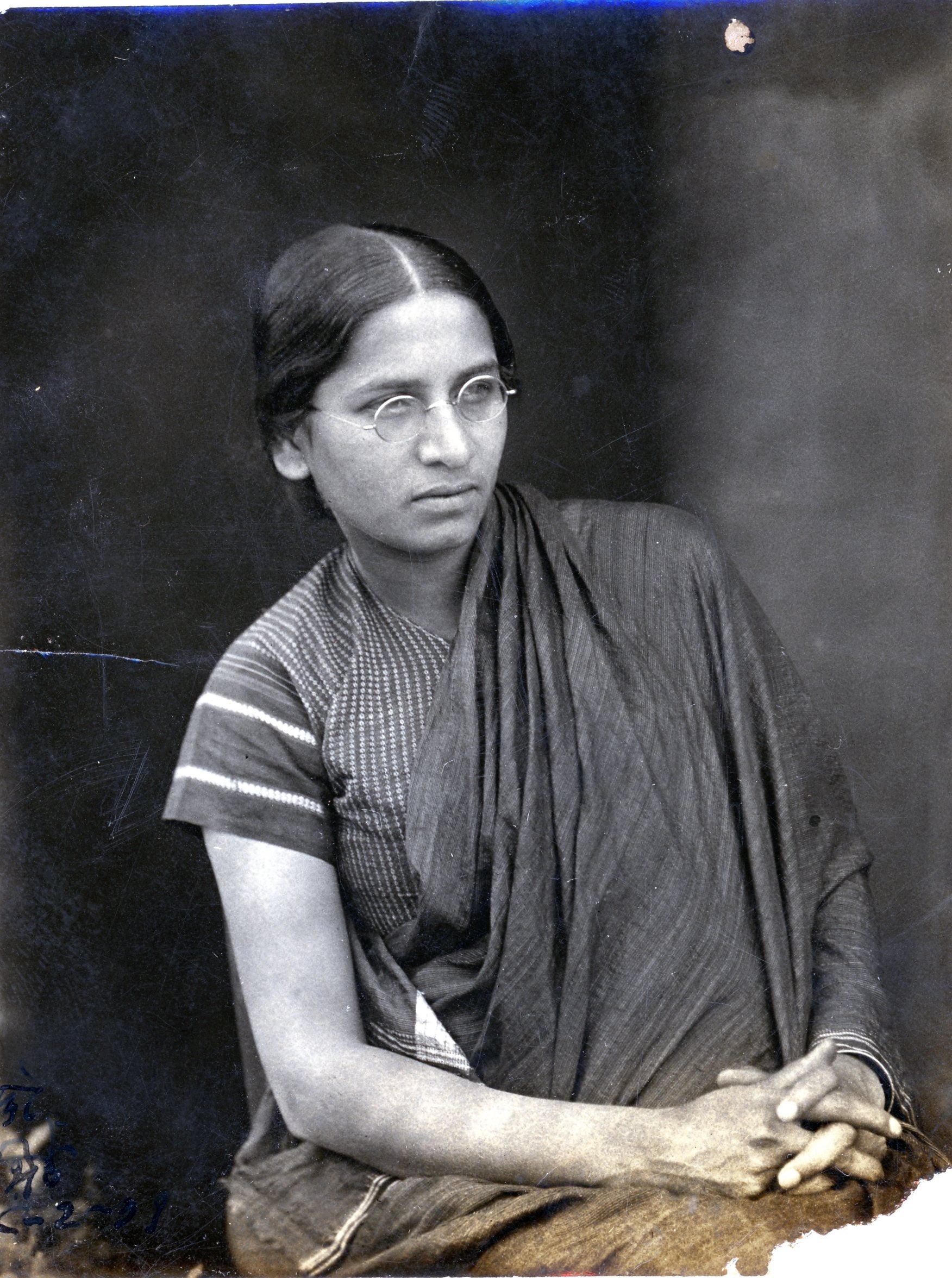
Irawati Karve, pioneering Indian anthropologist and the subject of Iru: The Remarkable Life of Irawati Karve, photographed in 1921. Courtesy: Urmilla Deshpande
Rohan: Karve was remarkably eclectic and prolific across a huge range of subjects. What was it like engaging with her, her body of work, and then also going up to the people who remembered her? Some of that may not have been easy to put down or to engage with. Urmilla, you talk specifically about your mother (the writer and poet Gauri Deshpande) and her fraught connection to Karve as well.
Urmilla: I think Thiago interviewed my aunt [Karve’s daughter] who, when I said I wanted to talk to her, she said, "I don't want to talk about my mother anymore"—which is fair; she's 90 years old and talked about her mother her whole life. But yes, I did have to engage with the way my mother dealt with her mother. I also read all of Irawati’s Marathi work. And that was interesting to me because I didn't know her as an adult myself, and it was like getting to know her. Her voice is really clear in those very personal essays. They're not like her academic work at all. She talks about the smallest little things and she connects the strangest things with each other. And that was really wonderful for me.
I think for Thiago it was different because he really spoke to people who knew her and her colleagues and her students, and so he got a very different picture of her. And yeah, I can hear the admiration that some of these people had for her, what influence she had, from listening to his interviews and his work. It was strange, because this is someone I knew of course, and yet found out that I entirely didn't know her. It was like finding this whole new person, so it was wonderful in a way.
Thiago: The interviews were really interesting, and I think it was surprising to me, a lot of people had many memories about her, even though she died 55 years ago.
Rohan: What is Irawati Karve’s legacy within the academy?
Thiago: In my PhD, my focus was very much on thinking about the legacies of scientific racism and thinking about the legacy of the idea of race in science. And also the impact of this very German emphasis on racial anthropology in this school of physical and biological anthropology, which, not just Irawati Karve, but also many other Indian anthropologists were trained in. Part of Irawati’s work can be seen with critical eyes today, and I think there's a lot of nuance here, and we might need a word of caution because usually the press shows people as either the hero or the villain. And what we're trying to do here is portray the story of a person who is neither hero nor demon. The hero aspect gets picked up a lot in many reviews. But I think there are many aspects of physical anthropology in general, including her work, but also that of many other people from that time should be criticized.
Even at that time, there were critiques. And I think she was remarkable in making the critique of a certain racial theory about the sizes of skulls [at the institute in Berlin]. In that regard, she's very remarkable and progressive. At the same time, her whole obsession with measuring bodies to study the castes and tribes of India and many other places, it's something that today I think we have reached the agreement that there are many flaws in there, and a lot of that comes from racial sciences. And that's also something we showed in the book. At the same time, her work on many other issues is still very remarkable and could still be articulated for a lot of progressive thinking today, such as her attention to the situation of women in Indian society. She formulated some theories about the origins of caste difference, which are still debated today. And I think some of it also needs critical attention because some of her ideas are being picked up by geneticists in the US, sometimes rather uncritically. And of course, questions of the national cohesion and diversity in India is something that she wrote about.
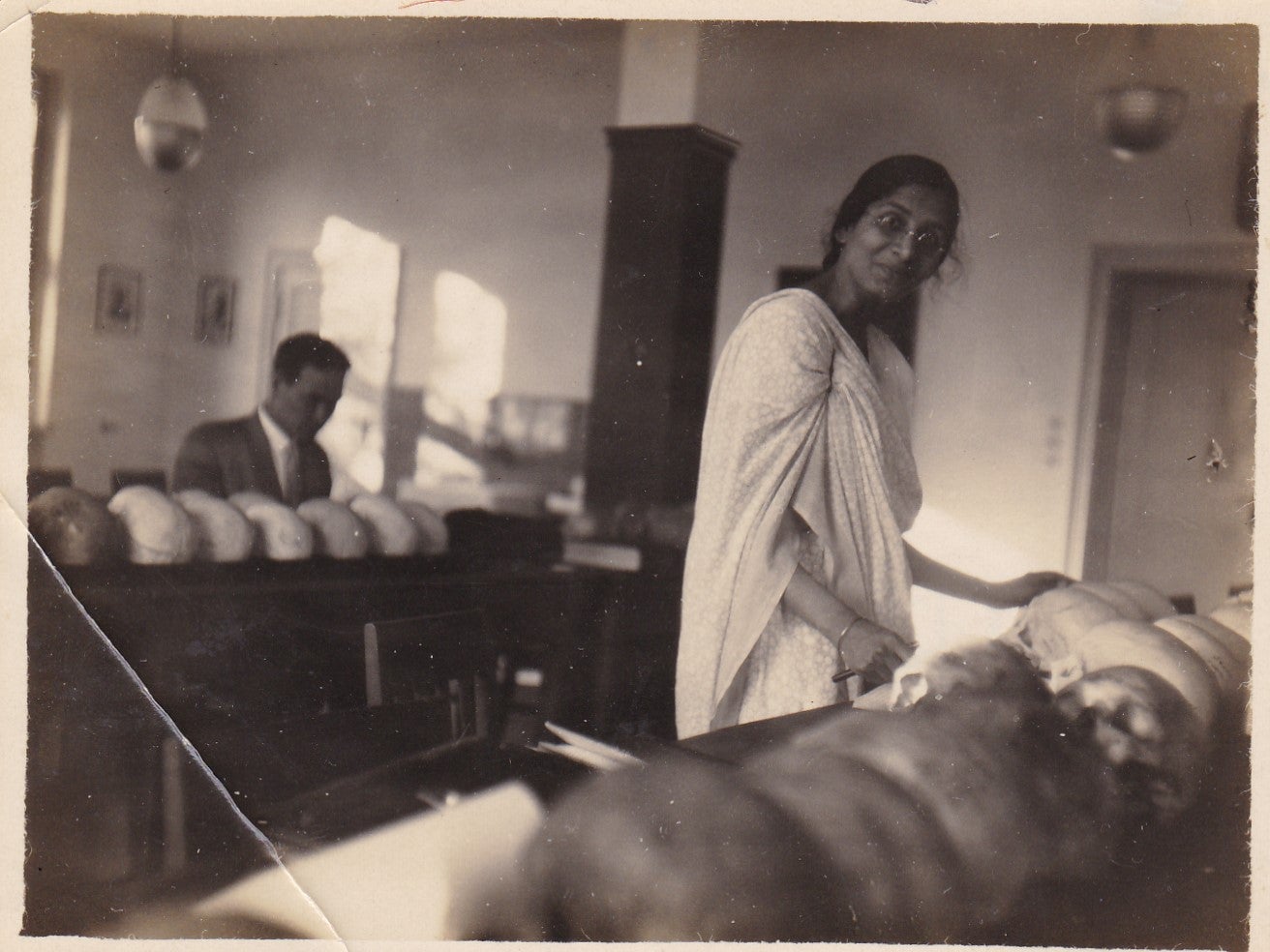
Irawati Karve with human skulls at the Kaiser Wilhelm Institute of Anthropology, Human Heredity, and Eugenics in Berlin, 1928. Courtesy: Urmilla Deshpande
Rohan: Was there a fear that you would find yourself explaining or apologizing for the more criticized bits of her work?
Urmilla: From the beginning, Thiago and I got on, because we both knew, particularly me because I'm her granddaughter. And I think Thiago needed to know this before he engaged with me—that I wouldn't apologize for her. I had no intention of creating some mythological figure.
Thiago: If I would have had the impression that we wanted to write a hagiography, I wouldn't have been in this boat. I think we connected very well on this. The way the book ends, I think that's the antagonism of an apology, because it actually ends with—and people have interpreted this differently in some of the reviews—on this kind of confessional, philosophical rumination, where she sees herself very implicated in bigger processes of societal violence. And that's something that she does also to think about her relation to those German scientists who did happen to be Nazis after she left Germany. When she writes about [German anthropologist and Nazi social scientist] Eugen Fischer when he's very old, I think for his 80th or 85th birthday, the word she uses to describe him is humanity. That's a positive word. Because I think that was in a time where maybe one might have thought Nazis are monsters. Similarly, today we might think of fascists as monsters. But she goes on to say they're human, and the implication of this statement is quite profound. And then she thinks about the concept of Atma to reflect about these questions, because she sees herself also implicated in this collectiveness of being in a world where there is a lot of evil, which is also very human. And I think that that's the opposite of an apology.
So, to that extent, I think the beginning of the book is a bit catchy and might make the impression that she's an anti-racist hero. But I think the end is the opposite of that. And I think those are the kind of discussions that are worth having. Also, in thinking about racism, about labeling a person racist or non-racist, I think there are different ways to be racist and different ways to be anti-racist. And sometimes the same person can have contradictory positions in this discussion, right?
Urmilla: I think that's why both of us are a little frustrated sometimes. We are very delighted with the reviews. I wasn't expecting the book to get so much attention. But I think we get a little frustrated sometimes with the hero element. We didn't say she was one, we tried very hard not to do that, to let her intentions be clear, to portray her as this complicated, nuanced person.
Rohan: It's something that both of you engage with, not just on the question of race, but also on feminism, given that Irawati was a true pioneer in her field and in thinking about women in society, but then had to grapple with these ideas personally.
Urmilla: I always wondered why my mother didn't talk about her mother [Irawati] as a feminist, because that was not her experience. And that's really important to me. Although Irawati may have been a certain way ideologically, she did not follow those things through in her own personal life. And my mother did. She always did. So, I saw that contrast very clearly. Your parents can be models for what not to be. And I think my mother took that to heart. She didn't behave with me and my sister the way Irawati was with her—my mother didn't get the support she should have. Now, my mother didn't articulate these things, but I could see them, and I can see them in the way she was with me. It was a contrast to what her mother did.
So, for sure, Irawati’s feminism is questionable to me. But of course, it existed. She did what she did in her time, and it was a lot, but from my mother's point of view, that's the nuance. You can't just say, “oh, she was a feminist” and leave it at that. That’s not good enough.
Rohan: It also shows up in the work. In one portion you have a reference to her nuanced response to wife-beating while out in the field.
Urmilla: That was in her Marathi essay, where she was clearly talking about it being widespread. She said, look, as an anthropologist and as a social scientist, I know and I see that this happens and this is widespread everywhere, that's all I'm commenting on. I'm not trying to say it's good or it's bad, because clearly it's bad. I mean, she said, I shouldn't have to comment on that. You know it's a bad thing. But I am saying that it's absolutely widespread and we shouldn't act as if it doesn't exist, it exists everywhere. And she was trying to prove that. She did have a nuanced way of looking at things, for sure, but sometimes I think it frustrated her that she was saying the obvious thing. At one point, she talks about her being introduced always as some man's appendage—wife or daughter or student, and so on. And when she said that in an ironic essay, people took it seriously. They thought she was celebrating it. She was always frustrated by that. She's like, I'm stating the obvious, and yet people don't get what I'm saying.
Rohan: Tell me about the presence of French anthropologist Louis Dumont, his space within Indian anthropology and the dialogue between him and Irawati. I found it interesting because, in the Q&A at the end of the book, you mention that there is still much Eurocentrism in the field.
Thiago: Because I'm also from Brazil. I was a bit scandalized by this when I went to Germany. That's something—thinking about Eurocentrism—that I will take with me through my life. And that's why I also thought Irawati’s case was interesting to think about because she was an Indian person in Berlin in the 1920s, and being trained in this very Eurocentric school. She was trying to find her way through that, but still being trained in a tradition and wanting to remain a part of that community. And I think that's the challenge for a lot of us who think about those things and who are not from Europe or the US, this double bind. That debate was fascinating for me because that's something that Nandini Sundar observed in her short essay about Karve's life and work, which was also the beginning of our collaboration because Urmilla and I met through Nandini.
She pointed out that the critique that Dumont made of Karve’s most international book, Kinship Organization in India, demolished Karve's international career. In the critique, you can sense that very old French male anthropologist using a sarcastic, very bitter tone, really taking the whole thing apart and calling her this Brahmin lady from Maharashtra, and also emphasizing the gender, which is a little detail, but very telling. And then asking the question of whether she is mixing all these different things, history with the reading of mythology and ancient text with anthropology, what is this? Is this even the proper anthropological method? Is this a Brahmin method? He made the same critique with other Indian anthropologists. That's something Veena Das also wrote about in her book, Critical Events. She has a chapter about the legacy of Dumont for Indian sociology and anthropology because he was this gatekeeper figure, editing the first very internationally known journal of sociology, Contributions to Indian Sociology. And that review came out in the first edition of that journal.
The funny thing is, apparently someone from that journal wants to write a review about our book. So, it's going to be a full circle moment. Or they could repeat what Dumont did and destroy our book. And then in both cases, I'm going to laugh about it.
Urmilla: We're already laughing about it.
Rohan: I wondered if you might be anticipating similar pushback from critical fabulation—"Is this real biography?” that sort of thing.
Urmilla: I can answer this in just two examples. There are two people in my family who I love very much, one is a young white man, one is an older white man. But they read the first chapter and they were like, "What is this? This is not how biographies are written." But beyond that, I wasn't expecting pushback or anything else because I'm honestly amazed and shocked at how far this book has gone.
Thiago: To be honest, for me writing this book was very liberating because I learned that, even though it's very much based on research, to be able to just craft a story and not think about what people are going to think and make a story that is real, but still not being subjected to a journal's format or to what an academic publishing process would want. I enjoyed it a lot. And Urmilla had to also take me out of that place because sometimes I was obsessed with the format and the language and changing little words, and Urmilla said, just write, and then we see. We wanted to do something that is true to the person, something that is also beautiful. I think we are happy about that.
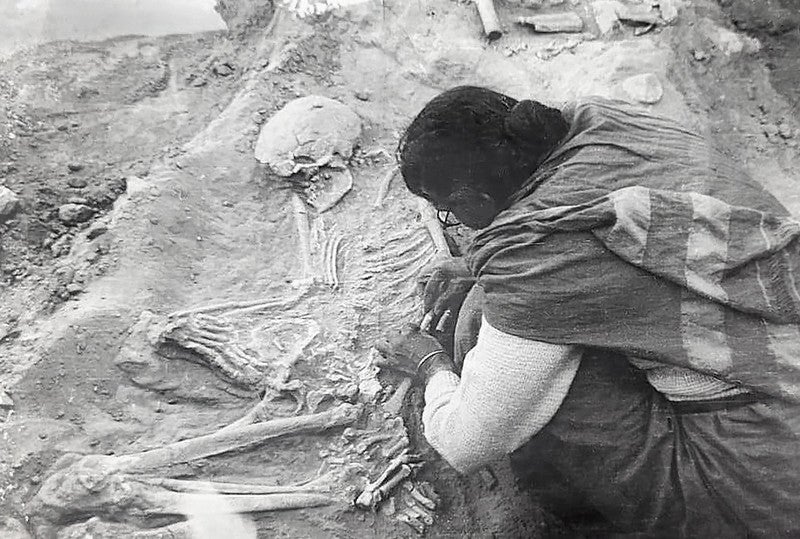
Irawati Karve with human remains from the Mesolithic period, Langhnaj, Gujarat, 1944.
Courtesy: Urmilla Deshpande
Rohan: Are there misconceptions about either Irawati and her work, or this book, that you find you'd like to answer or respond to?
Thiago: The heroism, turning her into a hero in the reviews, is something I didn’t expect to happen. It's not something that bothers me so much. But I think if readers are going to grab that book thinking they're going to be reading about a hero, and then they end up seeing a lot of Nazi stuff and a lot of complicated existential questions, maybe that works for me.
Urmilla: That's a good way to look at it. If it makes them pick it up, that's not a bad thing.
Thiago: We had a few moments where some people doubted that some things happened when they actually happened.
Urmilla: We didn't make up actual incidents.
Thiago: For instance, one of the most critical reviews that we received so far was someone who was basically saying the book wasn't critical enough because it was so close to the person. And I think that's okay as a critique. But that person said some things were maybe made up, like an encounter with the Mahars. And, well, it was not made up. She wrote about this. Maybe it comes from that conception that a Brahmin anthropologist could not have talked to someone from a lower caste that way. So, in some cases we have some people doubting that some things actually happened, when there is actually a lot of evidence that they did.
Rohan: I wanted to push you on the hero question. Wouldn’t some of it come naturally from choosing a subject and devoting a book to them?
Thiago: That's maybe the risk of writing a biography because then you single out a person, and then it might sound like everything she achieved was on her own. But we were careful about that. And also showing even her privilege of being an upper caste, from a family with very good economic condition. We did highlight that to say, okay, it's not that everybody could go to Germany back then because they wanted to. There was a lot of will and personal agency, but also a lot of social circumstance. So, there are risks in doing a biography. At the same time, I think a biography is a very good genre to talk about the complexities in life and to trace complex relational stories from the perspective of a person. The stories are very relatable to the person reading because they're personal. So there are many benefits of writing a biography too. And I wanted to do this too because in my other book, which is coming out in May, I'm focusing on the questions of scientific racism and the racializing legacy of the German school where she was trained, the legacy of herself in this discussion about the racialization of caste. And that's a very different book because I'm looking at the context, I'm looking at academic discussions, and so on.
Urmilla: To be fair to us, neither of us intended to write a biography. We got this opportunity because I wanted to write a novel and he had done his dissertation already. For me, it was more about not wanting someone else to do the biography because I feared it would have been this whole, “Irawati Karve, the first anthropologist who crossed the seven seas” sort of thing. We didn't want that to happen. So, I also volunteered because of that.
Rohan: I'll also put it to the both of you that the equivalent American or German or French figure probably has five biographies about them, and one can be critical and one can be intellectual, and one can be personal. You also run the risk of this being the only major work about her, and then assumptions that get built into that.
Urmilla: Yes. Again and again, I'm really coming back to the same answer, which is that we didn't know beforehand, which I think ultimately has been good for the book—to not have thought through all these things and to not have assumed that it's going to get attention, that people are actually going to read it.
Thiago: The things that I was concerned about were the things that we highlighted here, the nuance and showing the contradictions of the person. And I think we invested in that.
Rohan: What else would you recommend to readers who are interested, including your own work?
Urmilla: If someone wants to go further into scientific racism history, that would be Thiago's book that's coming out. And if someone wants to read more about Irawati's work, I'm actually working on translations of her Marathi essays, which are going to be with Speaking Tiger. And then I'm still working on my novel, which one day I will complete, so there's that. And I'm working on a new translation of Yuganta after that.
Thiago: I think from my side, my book that is coming out called Racializing Caste: Anthropology Between Germany and India and the Legacy of Irawati Karve (1905-1970) looks at the more critical aspect of Karve's work and thinks about the impact of this German school of racial anthropology. Besides that, I was very fascinated by the work of Projit Muhkarji, who is now at Ashoka University in Delhi. He wrote this book called Brown Skins, White Coats: Race Science in India, where Karve is also featured along other scientists from India. I'm now still reading something that I think is also interesting to think about in the context of Berlin in the 1920s and in Nazi times, as well as from the 1930s on, called Racism and the Making of Gay Rights; A Sexologist, His Student, and the Empire of Queer Love by Laurie Marhoefer, which is about the work of Magnus Hirschfeld, a German psychologist, and the complications of, limits to, or the contradictions of being anti-racist but, at the same time, being racist. This book really is a biography of Hirschfeld and his Chinese lover and student, and through these two biographies, the book thinks thoroughly about legacies of racism, also in connection to a discussion about queerness and gay rights. And I think the book does that in a very nuanced way as well, while also showing aspects of life in Europe in the 1920s and 1930s.

